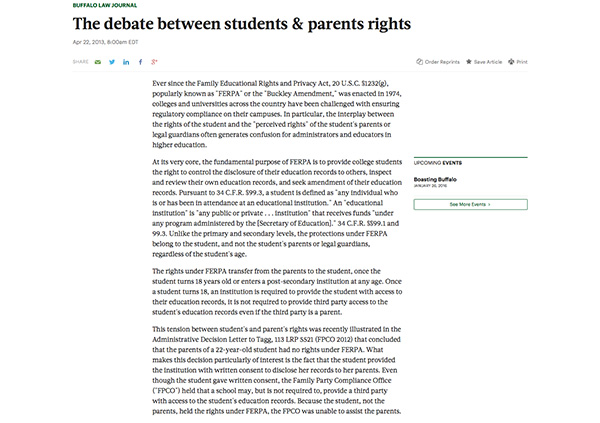Ever since the Family Educational Rights and Privacy Act, 20 U.S.C. §1232(g), popularly known as “FERPA” or the “Buckley Amendment,” was enacted in 1974, colleges and universities across the country have been challenged with ensuring regulatory compliance on their campuses. In particular, the interplay between the rights of the student and the “perceived rights” of the student’s parents or legal guardians often generates confusion for administrators and educators in higher education.
At its very core, the fundamental purpose of FERPA is to provide college students the right to control the disclosure of their education records to others, inspect and review their own education records, and seek amendment of their education records. Pursuant to 34 C.F.R. §99.3, a student is defined as “any individual who is or has been in attendance at an educational institution.” An “educational institution” is “any public or private . . . institution” that receives funds “under any program administered by the [Secretary of Education].” 34 C.F.R. §§99.1 and 99.3. Unlike the primary and secondary levels, the protections under FERPA belong to the student, and not the student’s parents or legal guardians, regardless of the student’s age.
The rights under FERPA transfer from the parents to the student, once the student turns 18 years old or enters a post-secondary institution at any age. Once a student turns 18, an institution is required to provide the student with access to their education records, it is not required to provide third party access to the student’s education records even if the third party is a parent.
This tension between student’s and parent’s rights was recently illustrated in the Administrative Decision Letter to Tagg, 113 LRP 5521 (FPCO 2012) that concluded that the parents of a 22-year-old student had no rights under FERPA. What makes this decision particularly of interest is the fact that the student provided the institution with written consent to disclose her records to her parents. Even though the student gave written consent, the Family Party Compliance Office (“FPCO”) held that a school may, but is not required to, provide a third party with access to the student’s education records. Because the student, not the parents, held the rights under FERPA, the FPCO was unable to assist the parents.
Although many colleges and universities offer parents access to student’s records, a parent has no such defined right under FERPA. Even in the situation when a parent or legal guardian claims a student as a tax dependent and provides the university with the most recent year’s tax return, it is within the school’s discretion as to whether or not the parents may obtain access to their child’s educational records. Specifically, pursuant to 34 CFR § 99.31(a)(8), if a student is claimed as a dependent by either parent for tax purposes, then either parent may have access to the student’s education records under this provision. Therefore, if a student is a dependent for income tax purposes, the institution may disclose any education records, including financial records to a student’s parents. However, it is important to note that the institution retains the discretion as to whether or not such disclosure will be made. The operative word that both lawyers and educators must note is “may” and not “must.”
As in the Tagg administrative decision, parents must be advised that even with consent, an institution can still deny them access to their child’s records. A golden rule for all practitioners in higher education to remember when questions arise is that FERPA protects the college student’s rights – not the parent’s
View original post on Buffalo Law Journal: http://www.bizjournals.com/buffalo/blog/buffalo-law-journal/2013/04/the-debate-between-students-amp-parents-rights.html

